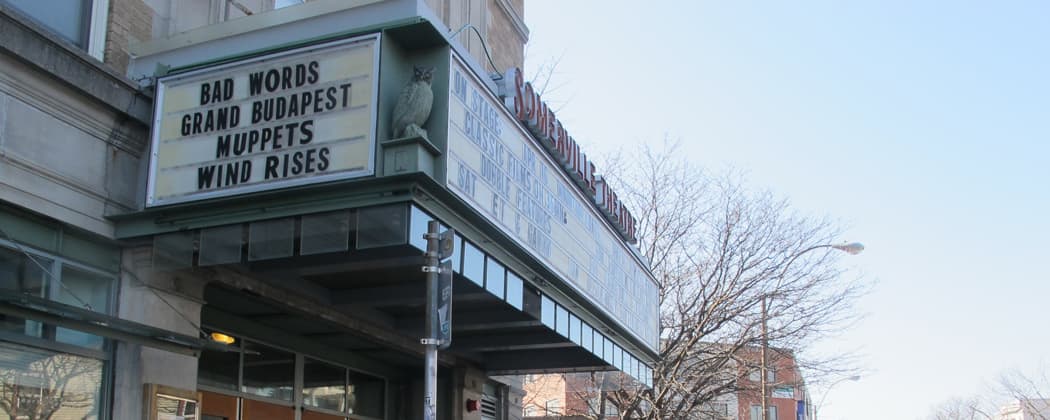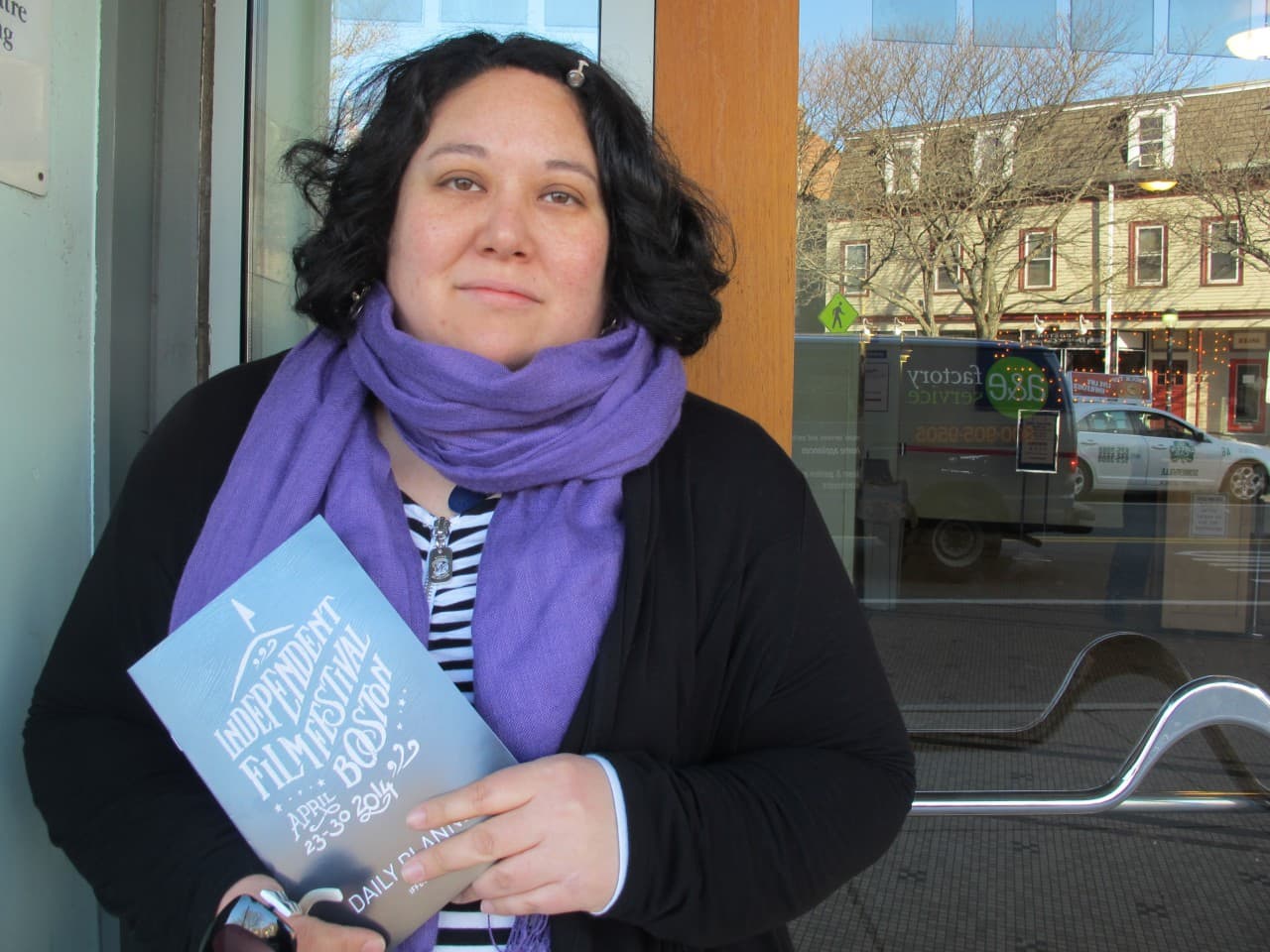Advertisement
Meet The Independent Film Festival Boston’s New Program Director

The Independent Film Festival Boston (IFFB) kicks off Wednesday and runs through April 30. Along with dozens of new films, the homegrown event, founded in 2003, has a new program director. Nancy Campbell is now filling shoes once worn by festival founder Adam Roffman, who left his post to pursue his blossoming career as a prop master and set stylist for Hollywood films being made in Massachusetts.

I sat down with Nancy Campbell in a screening room at the Somerville Theatre, where many of the festival’s films are slated to run. She explained how she started volunteering for the IFFB in its second year after attending in 2001.
Nancy Campbell: I attended the first year, and it definitely had the makings of a great festival. And I went with Brian [Tamm] who is now the executive director. We looked around us and it was a little chaotic and we thought, "We could help" [laughs]. So we volunteered the next year, and I’ve been a managing director and helping with programming for most of these years.
So what sort of film experience do you bring with you?
NC: I went to Emerson [College] to study film. I am actually employed at the Coolidge Corner Theatre. I’m the staff manager there and have been for several years, so that helps to afford me the time to kind of balance doing a film festival.
And it’s all volunteer, right?
NC: Correct. I mean we do pay projectionists, but they’re specialized. We have a core staff of about six people. All of us are volunteers and we bring on about 200 for the festival itself who volunteer as well.
So what does being the program director at a film festival entail? I know you watch a lot of films.
NC: We do, we watch a lot of films. We get about 1,000 films submitted to us and in the course of about eight, nine months we watch all of them. Brian, the executive director and Judy [Wong] who’s the associate director, and Adam on occasion — who advises us still whenever he can — we go to other festivals like the Toronto Film Festival and Sundance and South by Southwest and try to also find the talent that is out there, that is hitting the national stage, because we want to make sure that Boston gets to see what is going on at the sort of cutting edge of the independent film scene here in the U.S.
Is there a ratio that you try to keep to regarding local films or films from elsewhere?
NC: I don’t think we necessarily have a specific ratio. We hope for the best from local films. Like we don’t want to pigeonhole them as being, "Well, it was just good enough because it was local." We like the local films to be able to stand up.
How many films are in this year’s festival? And I know you can’t play, favorites but are there any that really struck you?
NC: There are so many great films. I think I was very moved by “The Case Against 8.” I saw that at Sundance, but it’s just so beautifully done. It’s basically about the fight against Proposition 8 in California, making sure that folks were able to get married no matter if they were gay or straight.
It’s just such a beautifully rendered film. For such a complex topic, they were able to condense it down to a way that you could see the history happening but you weren’t overwhelmed or bogged down by the details of it — and I think that’s a really difficult thing to do in a documentary that is so topical and so current. And it was exciting to see that in a film. I think it’s probably one of the best-done documentaries that we have this year. There are so many great films – both narrative and documentary – and obviously we’re a documentary town, so I could go on and on.
There’s just things you don’t know about before you see them in documentaries that I think are really exciting, like “Nine Man,” which is about this really aggressive form of volleyball that only happens in Chinatowns across the United States.
And this particular documentary happened to be filmed in a year when the championship was happening here in Boston, so that’s really cool to see, but also the documentary gives you a sense of the history of Chinese-Americans in this country, and it’s a really exciting discovery to have somebody say, "Hey, look, this is part of your community. And you didn’t know this.”
Is that what you look for when you’re reviewing all these films, the "wow" factor or the discovery moment?
NC: Absolutely. You just really want to see something you’ve never seen before. There’s nothing more exciting for me as a person. I’m just like the audience: I get really excited when there’s this topic that I've never even contemplated before. And it’s so exotic and being able to learn about it and sit down with it and have someone show you.
It’s like having a meal that you’ve never eaten for the first time, you know? It’s really exciting, and it’s what we always centrally want to do — it’s part of our mission — is to discover new talent as well as bring all of that to the audiences here. We’re just as excited as everybody else to share what we find. This is like panning for gold every year.
Well, yes, with the film industry just exploding, and the mass number of films, we need, as an audience, to be curated.
NC: There’s a lot of content in the world, and it’s equally as hard for filmmakers to be discovered, because that drugstore has become so large. So for us to be able to pick things out also helps very small filmmakers. We have a few world premieres. We have the world premiere of "Homemakers" from Colin Healey who’s based in Cambridge. And he’s an exciting new talent, and it’s a narrative, and it’s really exciting to be the first people to play this film.
And “Fight Church” about pastors who engage in multiple martial arts, so the conflict that they have between being a Christian and being extremely violent. These are films that we cannot wait to be the first person to show them to an audience.
So what’s the biggest challenge as now program director for you?
NC: The biggest challenge is always the resource of time. We have less people, and that definitely means we are all trying to pull a little bit more in terms of tasks that need to get done to get the festival happening every year. So we can always use more hands in that area. But also just in general resources. Our budget usually is in the realm of about $120,000. We are basically making a film festival happen on a budget that is less than what many of our filmmakers work with.
And it can be very, very frustrating, but overall it's so rewarding. We have volunteers that have become friends and roommates, and we’ve actually had a few marriages and festival babies at this point, so it is about that connection with film, and I think that that really makes it worth it.
Before we wrap it up, let's talk about one more local film: “The Internet’s Own Boy: The Story of Aaron Swartz.”
NC: We’re expecting there to be a reaction to seeing it. I think there are a lot of questions, and they’re very of the moment. And that whole situation is very complex. I’m curious to see MIT respond to something that’s so set in their backyard.


